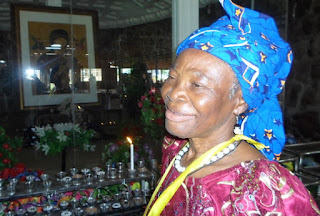Reflection for the Solemnity of Christ the King, Year A.
(Eze 34:11-12.15-17, Ps 23, 1 Cor 15:20-26,28. Mt 25:31-46)
 Today we celebrate Jesus Christ
as the Universal King. The readings today unveil to us the three ways in which
He rules. Equally, the Gospel tells us what we must do in order to reign with
Him.
Today we celebrate Jesus Christ
as the Universal King. The readings today unveil to us the three ways in which
He rules. Equally, the Gospel tells us what we must do in order to reign with
Him.
From the prophet Ezekiel, our
king is introduced as the Shepherd-King.
Here He rules by searching out and gathering His sheep. He will attend to the
injured and strengthen the weak. What about the fat and strong ones? The
Shepherd-King will watch over them and feed them too that they may remain
strong and never grow slim.
The work of a shepherd is quite
humbling. He has to bring himself down to the situation of his sheep in other
to help them. If a sheep strays and gets lost, the shepherd wanders around the
bush till he finds it. He stays with them in the pastures that they may feed. Thus
Jesus assumes our situation upon Himself as our King in other to gather us and
lead us to eternal life.
In the second reading, St Paul
presents another model of His majesty. Here Jesus is introduced as the Redeemer-King. He is that King who
saves us from evil, subjecting every power under his sovereignty. The last enemy to be destroyed is death.
As our Redeemer, He wipes away our sins and delivers us from the hands of
satan. He offers Himself as the first fruit from the dead, thereby opening the
pathway for us to share in the grace of the Resurrection. At the end, our
Redeemer-King transfers us to the eternal Father that God may be everything to everyone.
Thirdly, Jesus Himself talks
about His own kingship. He describes Himself as the Glorious-King. “When the Son of man comes in his glory, and all the
angels with him, then he will sit on his glorious throne” (Mt 25:31). We bow
down before His majesty. Before Him we gather and adore! His splendour fills us
with joy. Around Him we dance and celebrate. His glorious presence is with us
in the Eucharist. Jesus is our glorious King, who has become our reward, our hope.
“Come, O blessed of my Father, inherit the kingdom prepared for you from the
foundation of the world” (Mt 25:34).
 Christ’s faithful are royal
people. Therefore we are expected to emulate our King. The Gospel indicates we
should imitate Him in His capacity as the Shepherd-King. We cannot redeem anyone;
neither can we be the glory of others. But we ought to shepherds one another. We
do this when we feed the hungry, give drink to the thirsty, clothing to the
naked, welcome the stranger, visit the sick and the prisoner. Being shepherds
to one another after the example of Jesus sets us apart for the Kingdom of God.
Christ’s faithful are royal
people. Therefore we are expected to emulate our King. The Gospel indicates we
should imitate Him in His capacity as the Shepherd-King. We cannot redeem anyone;
neither can we be the glory of others. But we ought to shepherds one another. We
do this when we feed the hungry, give drink to the thirsty, clothing to the
naked, welcome the stranger, visit the sick and the prisoner. Being shepherds
to one another after the example of Jesus sets us apart for the Kingdom of God.
The kingdom of God awaits those
who acknowledge Jesus Christ as King in their lives. When we humble ourselves as
shepherd before others, God uplifts us as His royal Children. Jesus reigns; we
shall reign with Him.
Happy Christ the King!!!
________________________________________
Fr
Chinwenwa J. Nwachukwu, C.Ss.R
Hearts
of Jesus and Mary Parish,
Alulu-Nike,
Enugu.
Nov
26, 2017.


